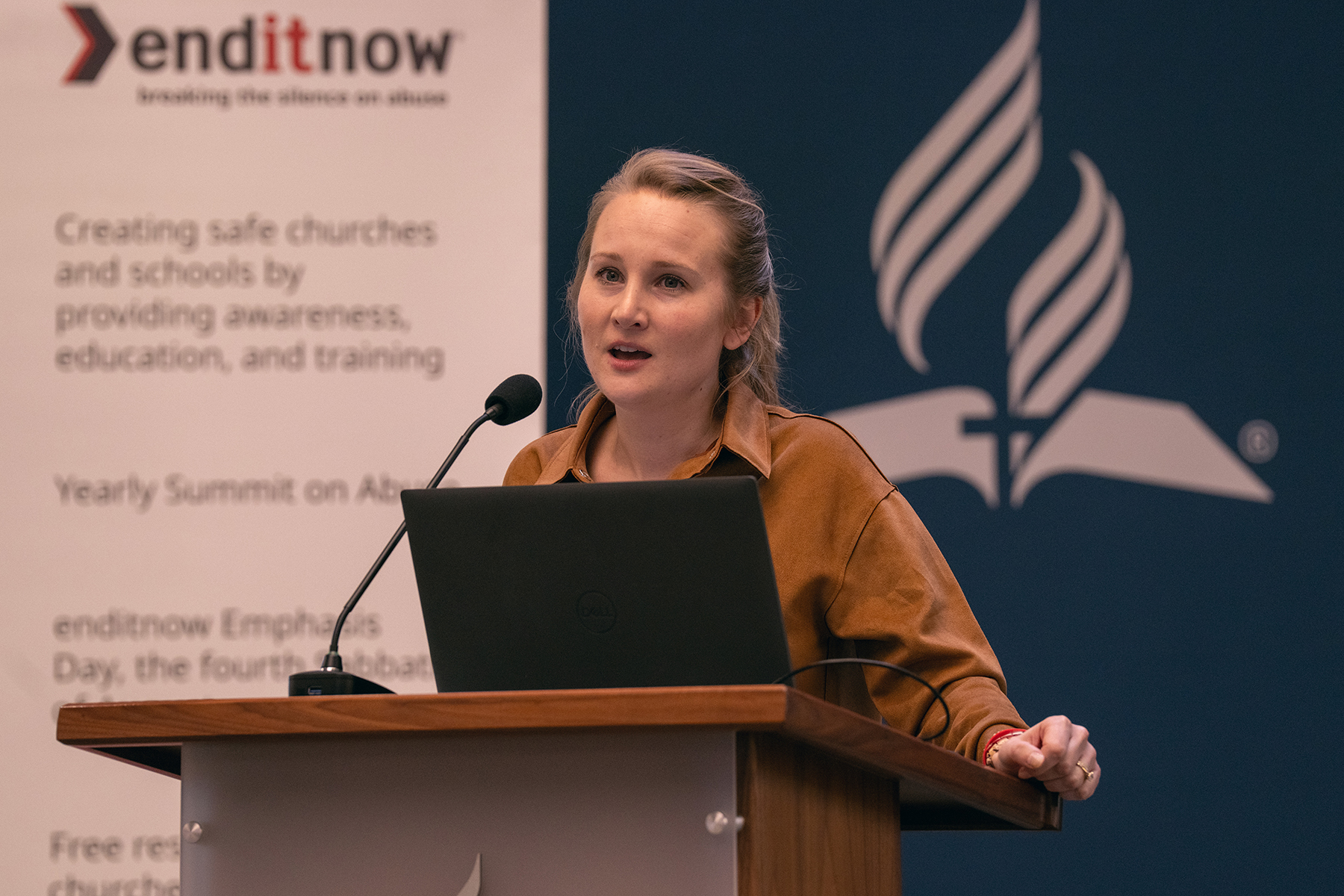
Erica Smith, assistant director of Women’s Ministries for the North American Division, speaks to attendees during the NAD's Safeguarding Peace training, held February 9–11, 2025, at the division headquarters in Columbia, Maryland. Photo: Pieter Damsteegt | North American Division
From February 9 to 11, 2025, a small but dedicated group of local church, conference, and union leaders, and lay members, met at the North American Division headquarters in Columbia, Maryland, for the NAD’s enditnow® Safeguarding Peace training on abuse prevention and response. Through presentations, pair and group discussions, and hands-on exercises, attendees were empowered to help make our churches safer spaces.
In his welcome, G. Alexander Bryant, NAD president, reflected: “Jesus connected the gospel to helping the vulnerable, … looking out for those who cannot speak up for themselves — the physically, emotionally, and mentally abused.”
Bryant affirmed attendees and thanked lead organizer Erica Smith, NAD Assistant Women's Ministries director, and NAD Women’s Ministries director DeeAnn Bragaw for “singlehandedly pushing [the enditnow®] initiative forward in our church and division.”
Later, Bragaw referenced Isaiah 3, where Jerusalem and Judah struggled to find a leader to fight injustice. In verse 7, a man refused, saying, “I will not be a leader. And I will not be a healer.” Bragaw emphasized that “leaders are healers,” pointing to Jesus as the ultimate healer, who fills us with what we need to follow His example.
Key Insights and Takeaways
The training was based on the Safeguarding Peace manual, created by professional advocates, church leaders, and educators. This was the third training since the NAD enditnow® team transitioned from live-streamed summits to in-person workshops in 2023.
Presenters included Smith, Doug Tilstra, retired vice president for student life, Walla Walla University; Rene Drumm, senior research professor of sociology, Andrews University; her husband, Stanley Stevenson, a licensed therapist; Melissa Ponce-Rodas, assistant professor of psychology and vice-chair, School of Social and Behavioral Sciences, Andrews University; Shannon Trecartin, Master of Social Work program director and associate professor, Andrews University; and Tracey Ray, executive director of Safe Haven of Pender in North Carolina.
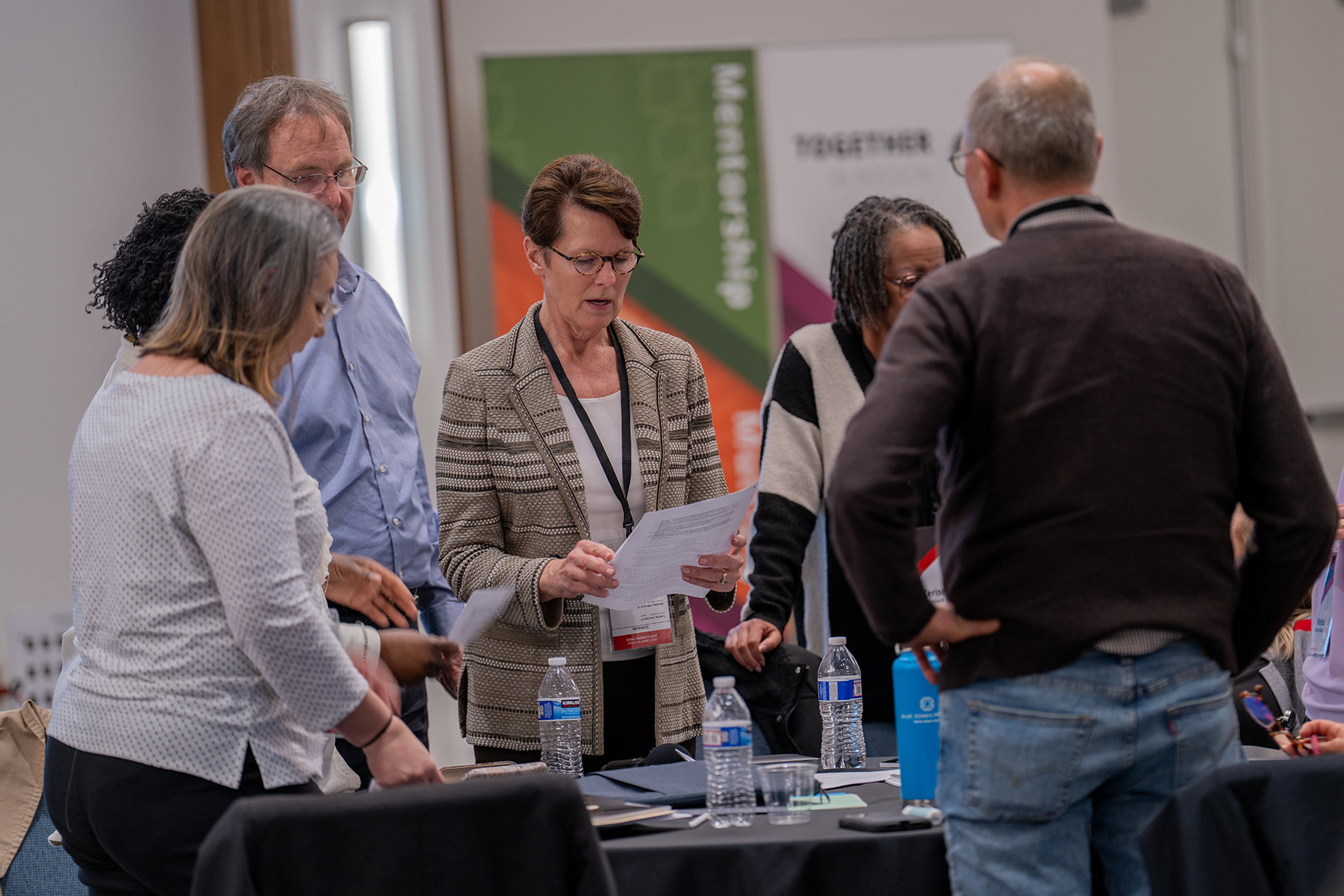
The NAD's 2025 Safeguarding Peace training benefited from the expertise of professional advocates, church leaders, and educators. Photo: Pieter Damsteegt | North American Division
Sessions explored facets of intimate partner violence (IPV) — “behavior within an intimate relationship that causes physical, sexual, or psychological harm.” Some of the eye-opening statistics shared include:
- 10 million adults in the U.S. experience domestic violence annually;
- One in four women in the U.S. and one in nine men experience severe sexual or physical violence and/or intimate partner stalking with health impacts; and
- Three women in the U.S. are killed by an intimate partner every day.
Presenters cited religion as a barrier to seeking safety, alongside cultural, emotional, and situational factors. Tilstra addressed belief barriers specific to Adventists. Notably, he emphasized that Ephesians 5 promotes mutual, voluntary submission; forgiveness and accountability can co-exist; and while God is pro-marriage, in a fallen world, separation or divorce may be necessary to preserve life.
Drumm suggested that while abuse often leads to spiritual disengagement, faith can also be a source of healing. “We can strengthen our church by strengthening victim-survivors and their spirituality,” Drumm said.
Addressing child abuse, risk management specialist Angelina Wood shared that one in four girls and one in six boys are sexually abused, and a quarter of all children face physical abuse. Furthermore, more than 90 percent of victims know their abuser. Wood recommended believing and supporting the child, staying calm, and reporting to authorities when a child discloses abuse. “It is of utmost importance that our children have a safe haven [and know] they can express when they are hurt, scared, or abused,” she stated.
Adventism Not a Protective Factor
Firsthand accounts illustrated the stark realities of abuse. Attendees heard the story of Karen, who suffered emotional, physical, sexual, and spiritual abuse by her husband, whom she had met at an Adventist university. She later developed cancer and struggled with suicidal thoughts. Participants discussed what might have helped her, agreeing that a culture of support within the church could make a difference.
Ultimately, Karen’s story was one of hope, as God reached her during a suicidal moment, and she found the courage to leave. Today, she is an advocate, declaring, “Whatever the reason [I was abused], God brought me through it. And if it’s to tell my story, that’s what I’ll do.”
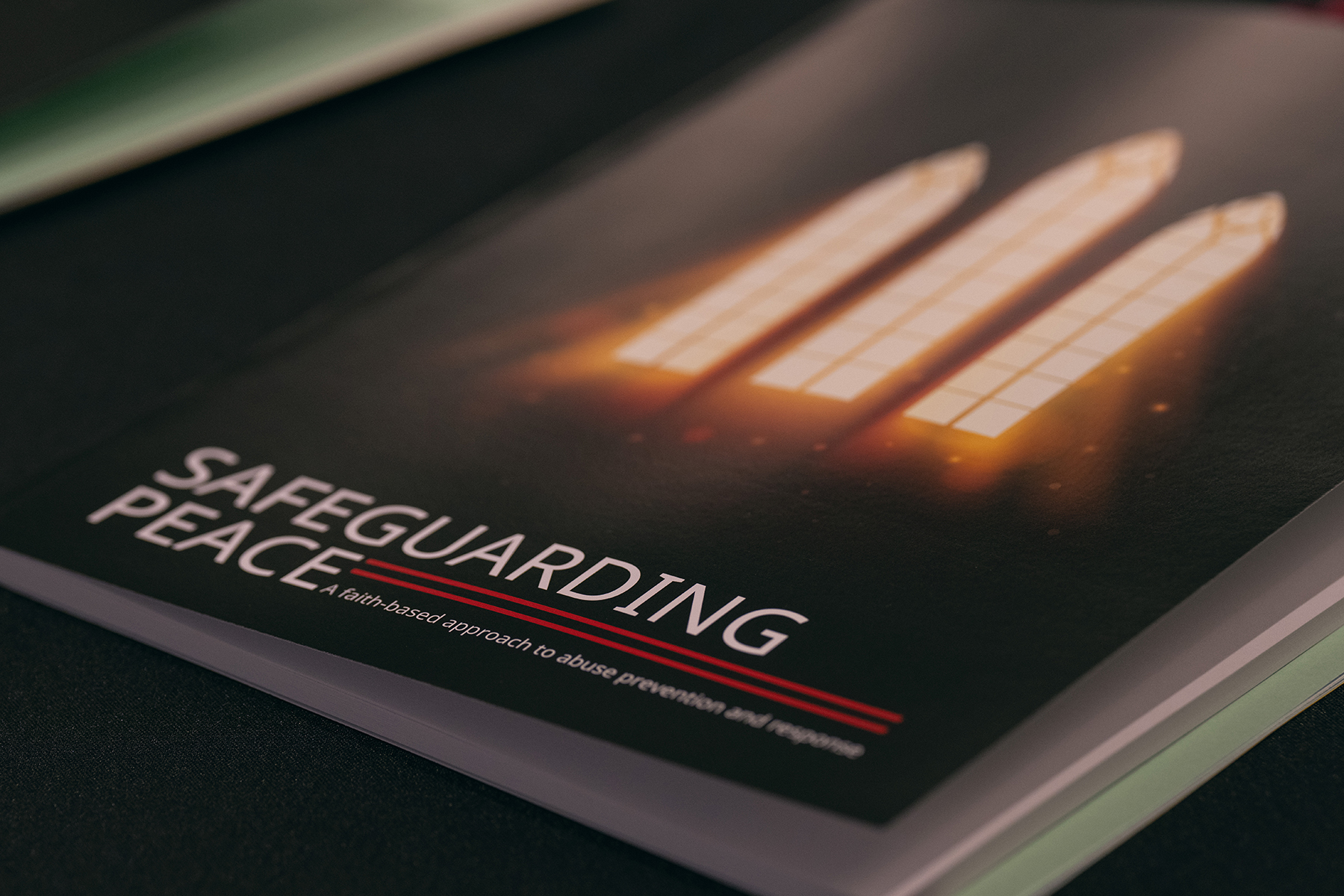
The NAD Safeguarding Peace training is based largely on the Safeguarding Peace manual, available for free through AdventSource. Photo: Pieter Damsteegt / North American Division
Trainers also shared testimonies from a qualitative study of 40 Adventist women who had experienced domestic violence, dispelling the myth that abuse is less prominent in the church. More than 90 percent of the abusers in this study were church members, including pastors, denominational workers, and local church leaders.
This study was a follow-up to a survey of 1,431 Seventh-day Adventist Church members in the North Pacific region of the U.S., which found abuse rates in the church comparable to national statistics. Overall, 33.8 percent of members reported experiencing abuse, versus 22.1 to 37.6 percent of the national sample.
“Being an Adventist is not a protective factor against being an abuser. Being an abuser has nothing to do with [your religion or faith.] This training helps me remember we’re dealing with human beings, and we all have the potential to do the most heinous things,” said Stevenson.
From Theory to Practice
A significant segment highlighted assessment, response, and prevention. Attendees learned three keys to a disclosure response — believe the individual, grieve their pain, and relieve them by offering resources and support. They also learned to assess safety and connect individuals to domestic violence teams or emergency services. Attendees role-played several scenarios as advocates or victim-survivors. Trainers also unpacked different levels of prevention: primary (system-wide efforts to prevent abuse), secondary (early detection and intervention), and tertiary (mitigating long-term consequences). This session ended with an overview of resources in North America, then had attendees create localized resource lists.
The program culminated in a voluntary skills assessment on February 11, with a 100 percent pass rate. The newly certified enditnow® advocates accepted responsibilities, including:
- Connecting with local service providers;
- Maintaining and sharing a local resource guide;
- Attending follow-up Zoom meetings with the Safeguarding Peace team;
- Holding an enditnow® emphasis day at their churches; and
- Being prepared to receive confidential disclosures of abuse
For the first time in this training’s history, advocates received a job description and a signed letter from Smith that they could present to their pastors, officially recognizing their role. Smith reassured them, “Sometimes you will feel alone [as an advocate], but you aren’t. Your church, the NAD Women’s Ministries, and the [enditnow®] team have your back. We’re here for you.”
Building a Community of Advocates
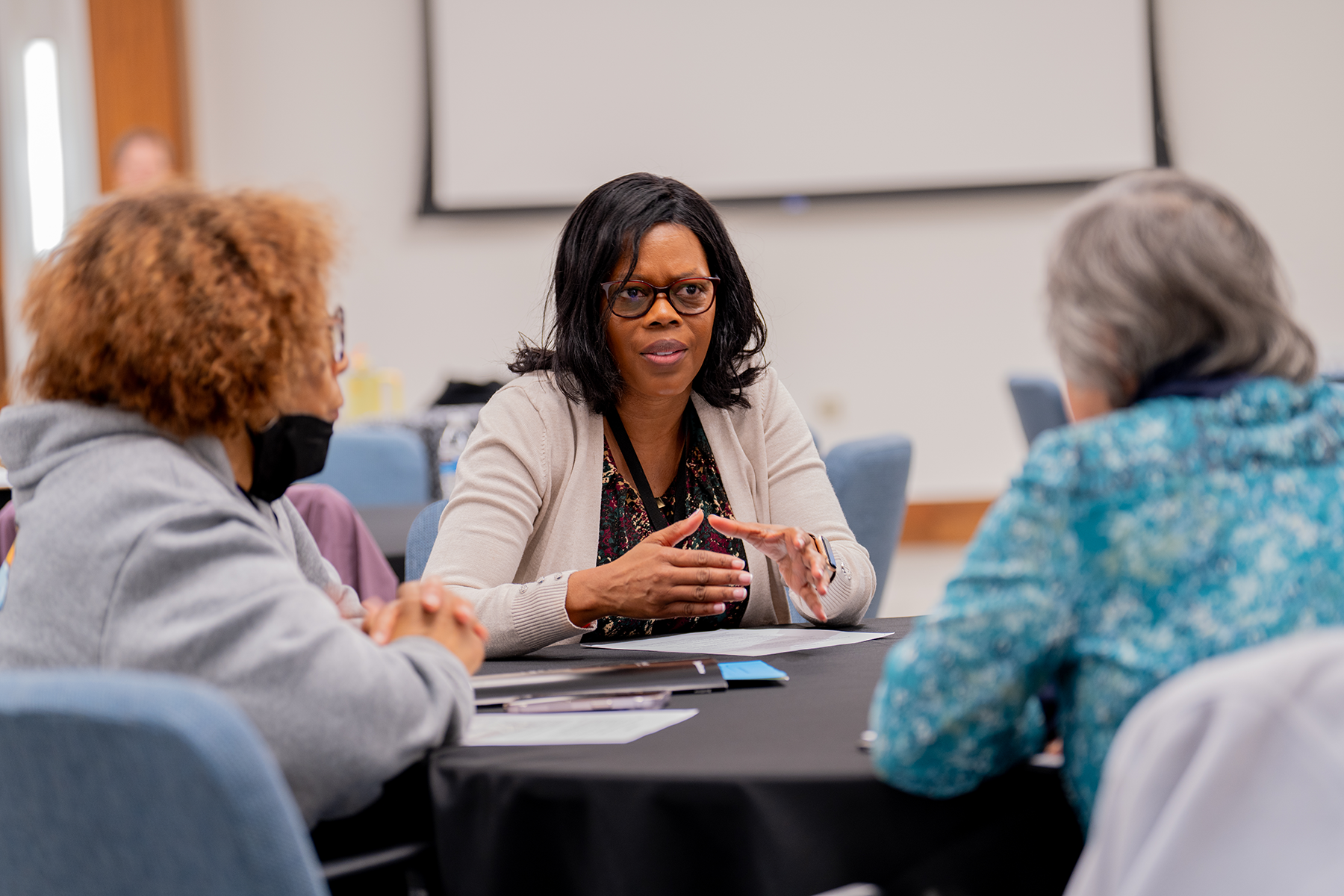
Roxanne Jones, a past attendee and enditnow® coordinator for the Northeastern Conference, center, chats with fellow participants at the 2025 NAD Safeguarding Peace training. Photo: Art Brondo / North American Division
By the last day, attendees had formed a community of passionate advocates. Jose Rojas, the new Texas Conference risk management director, said that as a local church pastor for 15 years, he had often felt limited handling abuse cases without a counseling background. “These workshops [show you] how to better guide people to the right resources,” he said. Rojas added, “Many people need help, even within our churches. Churches need to raise their awareness of abuse and how to prevent it.” He planned to share his new knowledge with his pastors and bring Smith to his conference to run a Safeguarding Peace workshop.
Roxanne Jones, a previous attendee and enditnow® coordinator with the Northeastern Conference, brought two local church members. They plan to speak to the pastors and other church leaders on enditnow® initiatives. Additionally, she aims to advocate for the participation of all pastors within their conference at the NAD’s next training.
April Montana-Gonzalez, Southern New England Conference child protection coordinator and trust services assistant director, came due to a growing need for support in this area. She has focused on child protection, with 10 years of experience handling nearly 50 child abuse cases. But at her conference’s last camp meeting, she noted a high demand for domestic violence resources on her table. She was later approached by a pastor needing help with a domestic violence case. She saw the need to expand to help vulnerable populations more broadly.
Montana-Gonzalez appreciated Safeguarding Peace’s practicality and left with ideas such as integrating this training into the pre-marital counseling tool Prepare/Enrich, the Adventist high school curriculum, or campus ministry efforts. “God has given us a responsibility to speak up for those who cannot speak for themselves,” she stated. “There’s not a person who’ll leave this training without being changed and ready to act.”
Safeguarding Peace and enditnow® Expanding
The team’s reach is expanding, with increasing invitations to speak at conference camp meetings, workers’ meetings, and even the NAD’s most recent retreat for conference presidents. One of those presidents, Dave Miller, from the Maritime Conference in Moncton, New Brunswick, attended this training to glean more knowledge. These efforts and the Safeguarding Peace training support the growth of effective abuse prevention and response education in Adventist churches.
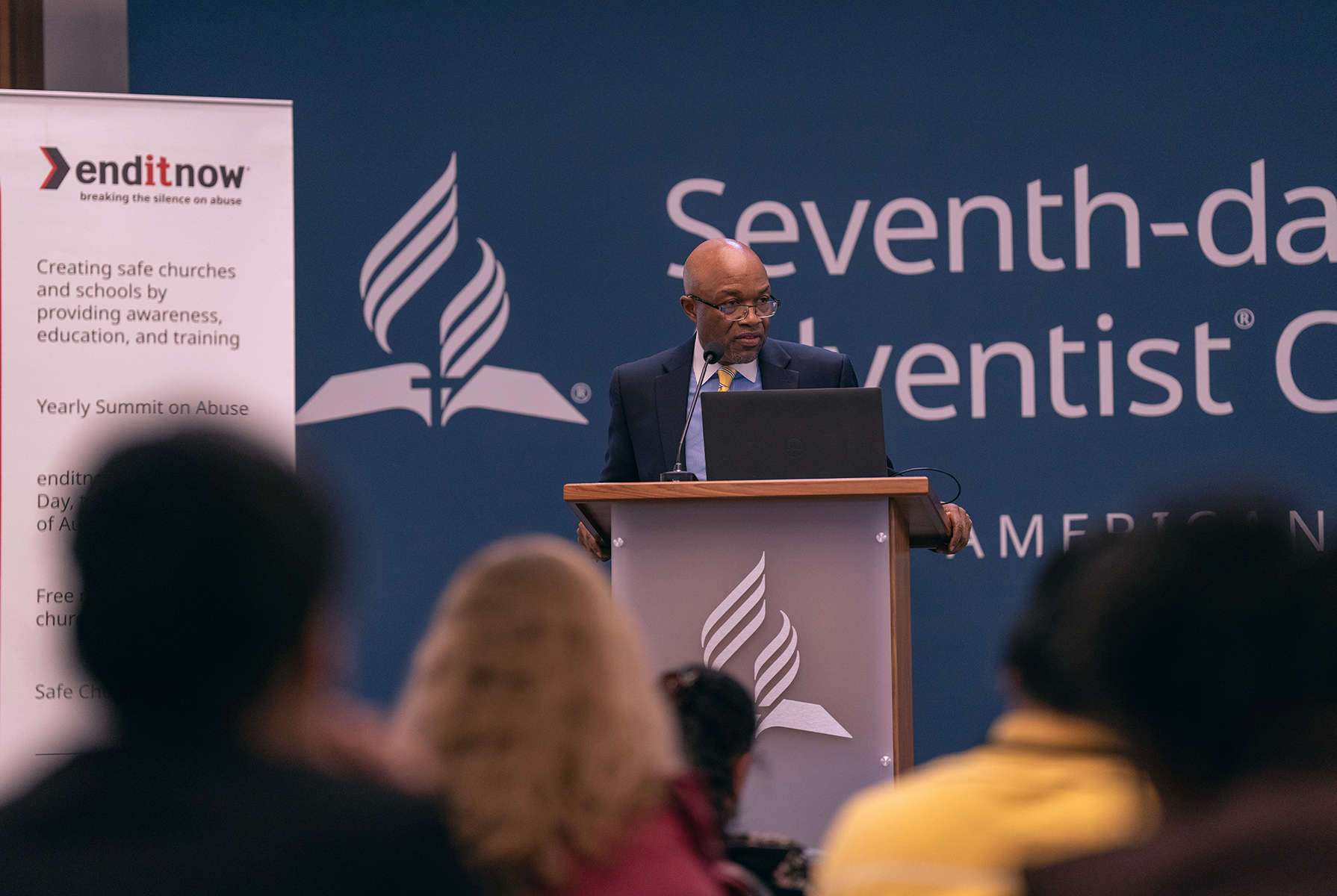
G. Alexander Bryant, North American Division president, affirms participants at the 2025 NAD Safeguarding Peace training for emulating the gospel of Jesus through advocacy.
Photo: Pieter Damsteegt / North American Division
To keep the momentum, the team will support advocates via Zoom. They are also developing two resources for Adventist Learning Community: a training for chaperones of known sex offenders attending church and an ambassador course providing basic education on abuse prevention and response. They eventually hope to host a trainer-of-trainers course for certified enditnow® advocates, further expanding the program’s reach.
But for the team, Safeguarding Peace is more than just a training — it is a call to action. Smith explained, “We’re talking a lot about evangelism with Pentecost 2025. And as we invite the community into our church, we have to be prepared to meet real needs. At any given event, on any given Sabbath, there are victim-survivors walking among you.”
Resources
enditnow® Emphasis Day: Churches are encouraged to participate in the annual enditnow® Emphasis Day on the fourth Sabbath of August. Click here for more info.
Find free resources at enditnownorthamerica.org and on the AdventSource enditnow page.
Click here to order the free Safeguarding Peace training manual from AdventSource.
To view previous sessions and presentations, visit the enditnow page of the Adventist Learning Community website or the enditnow YouTube channel.
Access national domestic violence resources at ncadv.org, thehotline.org, and theraveproject.org.
Access child abuse resources at childwelfare.gov, childhelphotline.org, Adventistyouthministries.org/safety-resources, and adventistrisk.org/en-US/safety-resources/topics/child-protection.
The Seventh-day Adventist Church in North America also offers a silent whistle program that allows users to send anonymous reports of abuse — https://www.enditnownorthamerica.org/silent-whistle.
